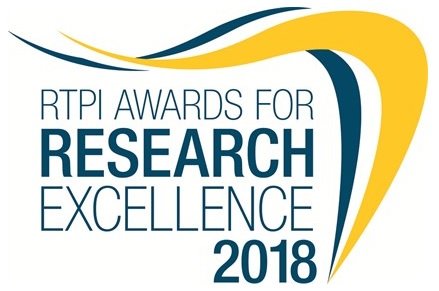 Quality of placemaking and the role of planning in supporting wellbeing were key themes among the winners of the 2018 Royal Town Planning Institute (RTPI) Awards for Research Excellence, which were announced this week.
Quality of placemaking and the role of planning in supporting wellbeing were key themes among the winners of the 2018 Royal Town Planning Institute (RTPI) Awards for Research Excellence, which were announced this week.
These awards are unique in recognising the best spatial planning research from the RTPI’s accredited planning schools, and highlighting the positive contribution of academic research and consultancy within policy and practice.
Idox is proud to have supported the awards since 2015, and this year we again sponsored three of the five awards (the Sir Peter Hall Award for Wider Engagement, the Consultancy Award, and the Student Award).
Tom Kenny, RTPI’s acting deputy head of policy and research, was enthusiastic about the winners and commended entries:
“The winners and highly commended entries have demonstrated how academic researchers can positively reach out to practitioners and policymakers with insights and findings to inform and influence their work.”
Setting standards for green infrastructure
The Sir Peter Hall Award went to a project exploring how green infrastructure can be better planned and recognises the wide benefits of the creation of the UK’s first green infrastructure benchmark.
The “Building with Nature” benchmark defines and sets the standard for high quality green infrastructure design and aims to address the gap between policy aspirations and practical deliverability. It results from the team’s research which revealed that uncertainty surrounds what constitutes high quality green infrastructure and that delivery is inconsistent.
The project brought together partners from academia and the third sector – Gemma Jerome (Gloucester Wildlife Trust and the Centre for Sustainable Planning and Environments, University of the West of England), Danielle Sinnett, Nick Smith, Tom Calvert, Sarah Burgess, Louise King (Centre for Sustainable Planning and Environments, University of the West of England).
Planning for healthier outcomes
The Consultancy Award was awarded to a study that helped planners in Southwark, London, achieve healthier outcomes. The research found that building trust with local communities is crucial to understanding perceptions around health issues, and that there is concrete evidence showing that changes in built environment design such as street layouts can improve the health of residents.
The winning project was ‘Healthy Planning and Regeneration: Innovations in Community Engagement Policy and Monitoring’ involved Helen Pineo (BRE and Institute for Environmental Design and Engineering, UCL), Simon Bevan, Andrew Ruck, Clizia Deidda (Southwark Council).
Cross-cutting impactful research
A study led by a team at the Bartlett School of Planning, University College London won the Academic Award for exploring the issue of the low quality of residential dwellings converted from offices without the need for planning permission, following the deregulation of the planning system in England in 2013.
Just 30% of converted ‘studio flats’ meet national space standards, and many office conversions in the middle of industrial estates have undergone barely any changes to make them fit for habitation.
The winning project was ‘Assessing the Impacts of Extending Permitted Development Rights to Office-to-Residential Change of Use in England’ – Ben Clifford, Jessica Ferm, Nicola Livingstone, Patricia Canelas (Bartlett School of Planning, University College London).
The Early Career Award went to the project ‘Estimates of Transaction Costs in Transfer of Development Rights Programs’ – Sina Shahab (School of Architecture, Planning and Environmental Policy, University College Dublin), J. Peter Clinch (Geary Institute, University College Dublin), Eoin O’Neill (University College Dublin)
And the Student Award went to ‘What do they know? The Power and Potential of Story in Planning’ – Jason Matthew Slade (Department of Urban Studies and Planning, University of Sheffield).
The full list of shortlisted finalists for the 2018 RTPI Awards for Research Excellence are available here. We also interviewed the winner of the 2016 Sir Peter Hall Award for Wider Engagement, Dr Paul Cowie from the University of Newcastle, about the impact of winning the award for the Town Meeting project, which used theatre to engage communities in planning.
We blog regularly on planning and environmental matters. Read some of our other articles:
- City trees: green infrastructure to help cities clear the air
- Science in the city: applying neuroscience to urban design
- Integrating green and grey: green infrastructure projects and approaches in Glasgow
- Pocket parks: making cities friendlier, greener and more resilient
- Do planners dream of electric streets?
- The kids are all right? Embedding children’s rights in town planning policy and practice
Share
Related Posts
Supporting residents on the decarbonisation journey: leveraging data for effective retrofit projects
As the drive towards decarbonisation intensifies, the social housing sector’s ability to collect, store and manage vast amounts of data becomes increasingly critical. With a shared goal of creating warmer, carbon-free homes, housing associations’ strategic use of data is essential ....
The recent spikes in energy costs have thrown into sharp focus the challenge of heating our homes. Domestic heating is important, not just for our comfort and wellbeing, but to reduce humidity and prevent condensation. But because traditional heating systems ....
By Ian Babelon A new-old concept for proximity “Are we there yet?” Parents may patiently nod to their children’s insistent nudges on a 20-minute journey to… somewhere. Quite rightly, researchers have asked: twenty minutes to what? The answer may well ....

